Review of the plant-based nutrition news October 2023
This month I cover healthy ageing, including cognitive health, adverse impacts of red meat consumption, benefits of plant-based diets for pregnancy and athletic performance, optimising iron absorption and more data on the benefits of diet change for addressing the climate and biodiversity crises.
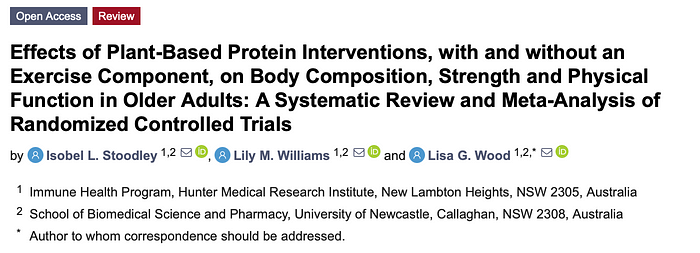
PLANT PROTEIN CAN SUPPORT OLDER ADULTS: An ongoing concern around plant-based diets is the ability to support healthy ageing and prevent frailty and sarcopenia (progressive and generalised loss of skeletal muscle mass, strength, and performance due to ageing). This comes from rather outdated viewpoints that animal-sourced protein is superior to plant sources.
This systematic review and meta-analysis brings together data from 13 randomised studies to summarise and evaluate the effects of plant-based protein interventions compared to placebo on body composition, strength, and physical function in older adults (≥60 years old). The secondary aim was whether exercise improved the effectiveness of plant-based protein on these outcomes. The studies were conducted in United States (n = 3), Japan (n = 3), Iran (n = 2), Netherlands (n = 1), China (n = 1), and Brazil (n = 1). In total, there were 806 participants included from studies published between 2002–2022. The study intervention duration varied between 12 weeks to 1 year. The overall daily dose of protein varied from 0.6g to 60g and all studies used soya as the plant protein. Most studies provided protein supplementation daily, The control group mostly received animal-sourced protein. The study reported outcomes for body composition, strength, and physical function.
The results showed that plant proteins (soya) were comparable to the control interventions including animal protein, exercise only, exercise plus animal protein, or no intervention controls. For lean muscle mass, when adjusting based on comparators, plant protein interventions were only favoured compared to non-animal protein controls. However, plant protein interventions were better for reducing fat mass. For strength and physical activity outcomes, plant protein interventions were comparable to the control groups. Interestingly, when compared to studies with exercise components, plant-based proteins performed better without an exercise component.
Overall, the results are reassuring that plant proteins can be effective at supporting healthy ageing. It would be useful to have more studies using protein sources other than soya and assessing the impact of an overall healthy plant-based dietary pattern on outcomes in older adults. We do have a recent study from Taiwan which included 12,784 participants aged 50 years and older followed for 8 years, which showed that a healthy plant-based diet was associated with a substantially lower pace of ageing.
This new review paper on diet strategies for promoting healthy ageing is well work reading.

RED MEAT CONSUMPTION AND TYPE 2 DIABETES: This new study provides us with some of the most robust evidence to date that eating unprocessed and processed red meat increases the risk of type 2 diabetes. Researchers analysed data from 216,695 participants from the Nurses’ Health Study and Health Professionals Follow-up Study. Diet was assessed with food frequency questionnaires every two to four years for up to 36 years. During this time, more than 22,000 participants developed type 2 diabetes.
The results showed that participants who ate the most red meat had a 62% higher risk of developing type 2 diabetes compared to those who ate the least. There was a dose effect, with every additional daily serving of processed red meat associated with a 46% greater risk of developing type 2 diabetes and every additional daily serving of unprocessed red meat associated with a 24% greater risk. When body mass index was adjusted for, there was a reduction but not an elimination of this risk suggesting that body weight alone is not the only reason for this finding.
Substituting a serving of nuts and legumes or dairy was associated with a 30% and 22% lower risk of type 2 diabetes, respectively. Interestingly, substituting for fish, poultry or eggs did not modify the risk and may even worsen the risk.
Observational data like these always attract criticism as it is usually assumed they cannot prove cause and effect. To address this, the researchers undertook additional data collection for dietary intakes to ensure accuracy and some additional. more rigorous statistical analysis. They were also able to assess the cumulative impact of red meat consumption given the repeated administration of food frequency questionnaires every 4 years, thus demonstrate the dose-dependent effect and therefore the strength of evidence.
There are so many plausible reasons why red meat increases the risk of type 2 diabetes. Saturated fat, haem iron, higher levels of branched chain amino acids are just some of the drivers of insulin resistance. In addition, meat consumption negatively impacts the health of the gut microbiome, which plays an important role in maintaining glucose regulation.
There is little doubt remaining in my mind that consuming red meat harms health. When the negative impacts of its production on the environment are taken into account, there is a strong argument to remove these ‘foods’ from our diet and food chain. Given that rates of type 2 diabetes are at pandemic proportion, this is a simple modifiable risk that could easily be eliminated.
This week we are once again reminded about the meat industry forces behind misinformation campaigns that continue to push meat consumption as healthy, necessary and desirable. Great work by Greenpeace for exposing these industry lies and the scientists who enable this. On this occasion it relates to the Dublin Declaration.
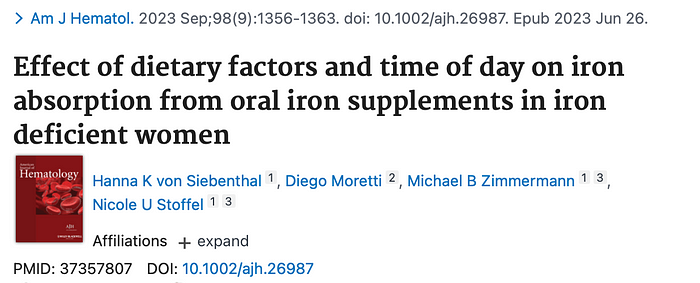
DIETARY FACTORS AND IRON ABSORPTION: Red meat is still recommended as a ‘good source’ of iron when trying to address iron deficiency. However, if a person is iron deficient, the best approach is to take iron supplements alongside optimising the diet for healthy sources of iron.
This small study is a nice reminder of how dietary factors can aid or hinder iron absorption. Absorption of iron tablets were assessed under 6 conditions in 34 people: 1) water (reference) in the morning; (2) 80 mg ascorbic acid (vitamin C); (3) 500 mg ascorbic acid; (4) coffee; (5) breakfast including coffee and orange juice (containing ~90 mg ascorbic acid); and (6) water in the afternoon.
Overall, the experiment confirms what we already know. Iron absorption was reduced by 54% when consumed at the same time as coffee. Coffee with breakfast reduced absorption by 66%. Whereas 80mg of vitamin C increased absorption by 30%, with the higher dose of 500mg not having additional benefit.
The authors conclude ‘consuming iron tablets alone with orange juice would result in a nearly 4-fold increase in iron absorption and provide ~20 more mg of absorbed iron per dose’. Of note, one cup (240mls) of orange juice will contain around 125mg of vitamin C.
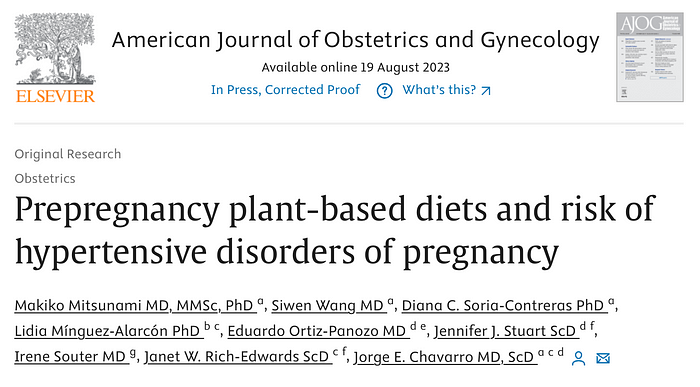
PLANT-BASED DIETS AND HYPERTENSION IN PREGNANCY: We have known for a long while that plant-based diets are effects at preventing and treating hypertension (high blood pressure). The therapeutic diet designed to treat hypertension, known as the DASH (dietary approaches to stop hypertension) diet, is very effective at lowering blood pressure and was based on a healthy vegetarian diet, with addition of some animal foods to be ‘more acceptable’.
This paper reports for the first time the impact of a plant-based diet on hypertensive disorders in pregnancy using data from the prospective Nurses’ Health Study. 11,459 women of child bearing age, who between them had 16,780 singleton pregnancies, were followed for 19 years. They had no history of chronic diseases, preeclampsia or cancer. Dietary assessments were taken every 4 years and the data were assessed using the plant-based dietary index. This index assesses the impact of eating a plant-based dietary pattern. The age at first pregnancy was 35 years and a total of 1033 cases of hypertensive disorders of pregnancy, including 482 cases of preeclampsia (2.9%) and 551 cases of gestational hypertension (3.3%), were reported.
The results showed that adherence to a plant-based diet reduced the risk of hypertensive disorder by 24%, with a dose-effect apparent. An unhealthy plant-based diet did not have a protective effect. Lower body mass index explained 38% of the association between a plant-based diet and hypertensive disorders. The beneficial impact of a plant-based diet did not appear to be related to any one food although intake of fruits, vegetable oil dressing (a proxy for intake of salads), and fruit juice was particularly beneficial, independent of other foods. In contrast, intake of meats (red meats, processed meats and poultry) showed an independent detrimental effect. The authors conclude ‘Higher adherence to plant-based diets was associated with a lower risk of developing hypertensive disorders of pregnancy. Much of the benefit seems to be related to improved weight control.’ The authors suggest that advice on healthy plant-based diets should be incorporated into preconception counselling.

PLANT-BASED DIETS AND COGNITIVE FUNCTION: We definitely need more data on plant-based diets, especially 100% plant-based diets, and brain function. I have summarised the data we have in my article on diet, lifestyle and brain health. This new paper adds some useful information on the topic.
Once again, my favourite plant-based dietary index has been used to analyse data from 658 community dwelling Dutch adults at baseline and again at 2 years follow up for 314 participants. Dietary data were correlated with measures of cognitive function. Adherence to a healthy or unhealthy plant-based diet was not associated with cognitive function — neither positive nor negative. However, there was a beneficial association between the consumption of fish ≥ 0.93 portion/week and adherence to a plant-based diet, with a slow rate of cognitive decline. No other animal-sourced food impacted the association with a plant-based diet.
This study does suggest that nutrients from fish — likely the long chain omega-3 fats DHA/EPA that fish get from algae — are important for brain health. It could also be that diet quality was not optimum given that participants in the highest tertile for adherence to a plant-based diet were getting on average only 26g of fibre and still consuming 26g of saturated fat (assumed to be from animal sources). The precautionary approach however may be that if you are consuming a 100% plant-based diet, DHA/EPA from algae sources is sensible to incorporate into the diet.
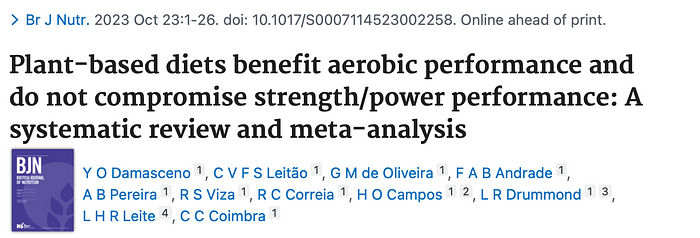
PLANT-BASED DIETS AND ATHLETIC PERFORMANCE: In case there were any doubts remaining, plant-based diets absolutely can support optimal athletic performance. This new systematic review meta-analysis included four studies evaluating the effects of plant-based diets on aerobic performance and six studies evaluating impacts on strength/power performance. Four studies used a vegan diet and six used a lacto-ovo-vegetarian diet. Two studies had women and eight had men as participants.
The results showed that a plant-based diet had a positive effect on aerobic performance and no impact (negative or positive) on strength/power performance. As expected, those following a plant-based diet had a lower body mass index. The authors conclude ‘despite the controversy surrounding the adoption of non-carnivorous diets by athletes, when considering the practical effects of plant-based diets on physical activity, it seems that these diets do not compromise exercise performance.’

DIET AND AIR QUALITY: We know that the food system is a leading driver of climate change and biodiversity loss. However, we don’t often discuss the impact of our food system on air pollution, despite the available evidence. Previous studies from the UK have shown that around a quarter to a third of air pollution in cities comes from farming and in the US, around 18,000 premature deaths are due to air pollution from farming, with 80% of deaths due to animal agriculture. This air pollution from animal farming comes from ammonia generated from animal manure and fertiliser use, contributing to particular matter 2.5 micrometres and also from methane emitted from ruminant animals, which contributes to ground-level ozone. This new study highlights very clearly how farming systems and diet choices impact air pollution and how diet change strategies could result in a very meaningful improvement in air quality and and health outcomes. Air pollution leads to a range of health harms, from increased rates of cardiovascular disease, respiratory conditions, cancer and also dementia.
No surprises with the results. With the modelling used, dietary changes towards lower consumption of animal source foods substantially reduced agricultural emissions that contribute to air pollution. The global reduction was calculated to be 84–86% for the adoption of vegan diets, 69–70% for vegetarian diets, and 44–48% for flexitarian diets. The greatest gains would be seen in countries with the highest meat consumption. The improvement in air quality was predicted to result in significant reductions in premature mortality, with the greatest gains for adopting a vegan diet — 236,000 avoided deaths i.e. 6% reduction in all deaths related to air pollution. Again, the degree of reduction in premature death was predicted to be greatest in the countries that currently consume the most meat.
So when you are next discussing air pollution and campaigning for better air quality, don’t forget to share the evidence supporting food system change.
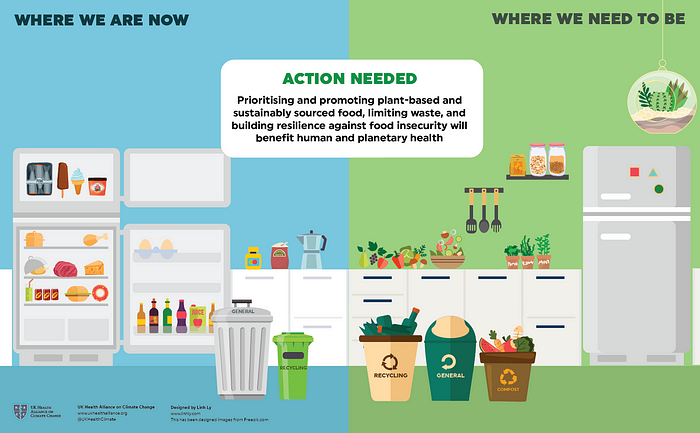
BIODIVERSITY, CLIMATE CHANGE AND HEALTH: We are delighted to have contributed to this new policy report from the UK Health Alliance on Biodiversity, Climate Change and Health, highlighting the negative impacts of biodiversity and nature loss on both land and sea on human health. We are in the sixth mass extinction event with more plant and animal species at risk of extinction than any other time in human history. There are several urgent actions that need to be taken to reverse this, one of which is to move to a predominantly plant-based food system. This is one of the key recommendations: ‘Prioritise and promote plant-based and sustainably sourced food, limit waste and build resilience against food insecurity. This can be achieved through a transition to sustainable diets by committing to prioritising plant-based and sustainable food while reducing meat and dairy consumption and food wastage. A parallel shift to refocus subsidies on sustainable agricultural production is needed.’ The report clearly documents the adverse impacts of animal agriculture on all aspects of health — both human and planetary. The report is well worth reading and sharing.
This week, the UK Health Alliance on Climate Change has coordinated an editorial that has been published in over 250 journals. It calls on the WHO to declare the climate and nature crises as a global health emergency. You can sign the petition here.
Please follow my organisation ‘plant-based health professionals UK’ on Instagram @plantbasedhealthprofessionals and facebook. You can support our work by joining as a member or making a donation via the website.
